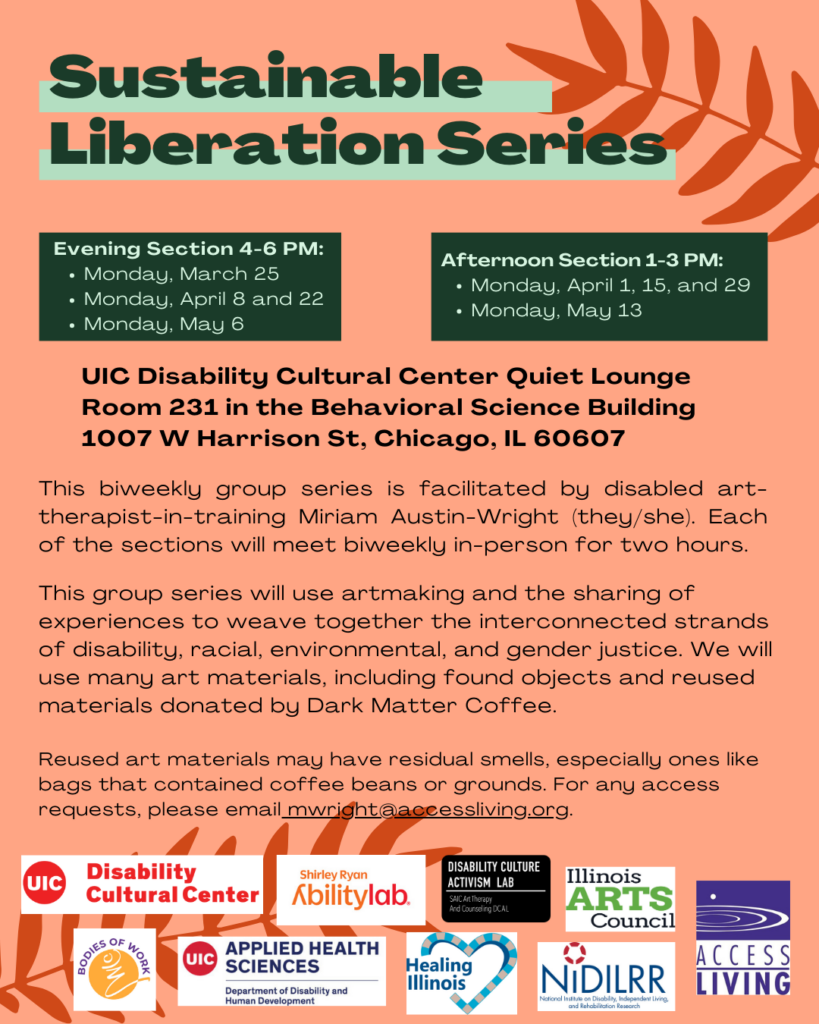- This event has passed.
Sustainable Liberation Series
April 22, 2024 @ 4:00 PM – 6:00 PM

The Sustainable Liberation Series is a biweekly group series facilitated by disabled art-therapists-in-training Miriam Austin-Wright (they/she). Each of the two sections will meet biweekly in-person for two hours at the UIC Disability Resource Center Quiet Lounge (Room 231). The afternoon section will meet 1-3 PM and the evening section will meet 4-6 PM.
This group series will use art-making and the sharing of experiences to weave together the interconnected strands of disability, racial, environmental, and gender justice. Just as these forms of justice and activism are interconnected, so is the liberation of the people facing injustices at the heart of such causes.
Materials used in this process will include many found objects, paint, paper, textiles, and materials donated by Dark Matter Coffee such as used burlap sacks, paper and plastic coffee bags, and coffee grounds.
Due to the sustainability efforts of this group, reused art materials may have residual smells, especially ones like bags that contained coffee beans or grounds. Additionally, this group is not considered, nor should it be a substitute for traditional group therapy, however, topics of mental health, wellness, advocacy, and healthy relationships will be addressed in a structured and confidential space. Participants are encouraged to attend as many meetings as possible to contribute to the group’s sense of trust and connection.
Access Information
Reused art materials may have residual smells, especially ones like bags that contained coffee beans or grounds. For any access requests, please email mwright@accessliving.org.
Due to high demand for ASL interpretation and CART captioning, please send your requests for these services at least 2-3 weeks before your session date(s).
Sustainable Liberation Series Session Dates:
Evening Session (4-6pm):
- Monday, March 25, 2024
- Monday, April 8, 2024
- Monday, April 22, 2024
- Monday, May 6, 2024.
Afternoon Section (1-3pm):
- Monday, April 1, 2024
- Monday, April 15, 2024
- Monday, April 29, 2024
- Monday, May 13, 2024.
About the Sustainable Liberation Series Facilitator:
Miriam Austin-Wright (they/she) is a graduate art therapy student at the School of the Art Institute of Chicago from Indianapolis, Indiana. A nonbinary, biracial, and disabled individual, Miriam is committed to building an intersectional therapeutic lens that perceives individuals as the multifaceted and experienced beings they are, capable of enacting transformation personally and in the communities in which they live. As an art-therapist-in-training, they hope to work from an eclectic approach, fusing and drawing from multiple therapeutic perspectives to create a decolonial, consumer-driven, liberating, and highly creative space.
Sponsor Information:
The Sustainable Liberation Series is supported by the Arts and Culture Project at Access Living; Shirley Ryan Abilities Lab; Bodies of Work: Network of Disability Art and Culture; the Disability Cultural Center at University of Illinois-Chicago; and the Disability Culture Activism Lab (DCAL), a teaching lab housed under the department of art therapy and counseling at SAIC. Bodies of Work is a part of the Department of Disability and Human Development within the College of Applied Health Sciences at University of Illinois-Chicago. This program received generous funding from Healing IL: funded by the Illinois Department of Human Services in partnership with the Field Foundation. This program is partially supported by a grant from the Illinois Arts Council Agency.
The contents of this series were developed under a grant from the National Institute on Disability, Independent Living, and Rehabilitation Research (NIDILRR grant number 90RTCP0005). NIDILRR is a Center within the Administration for Community Living (ACL), Department of Health and Human Services (HHS). The contents of this program do not necessarily represent the policy of NIDILRR, ACL, or HHS, and you should not assume endorsement by the Federal Government.
